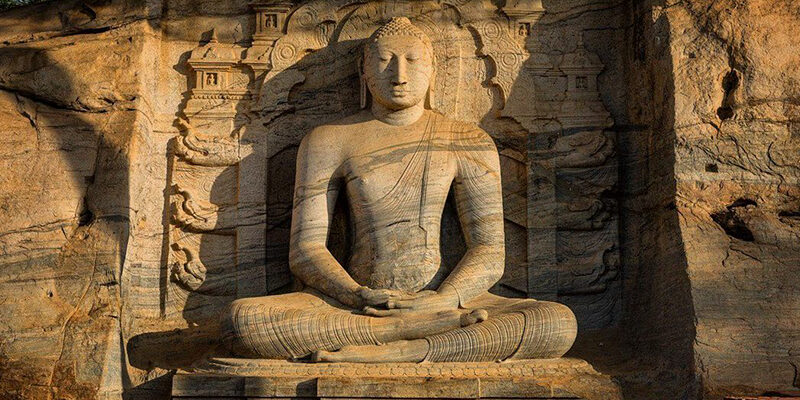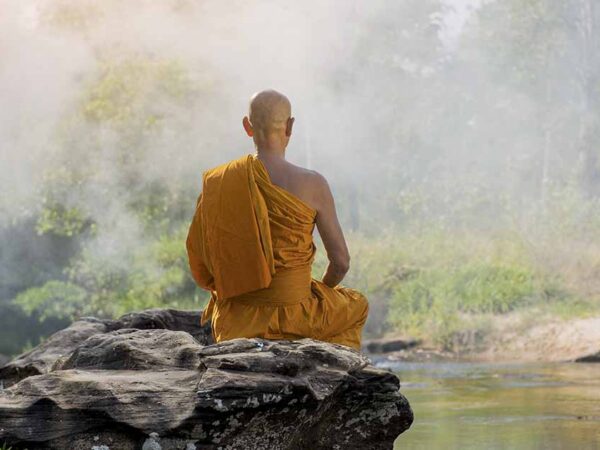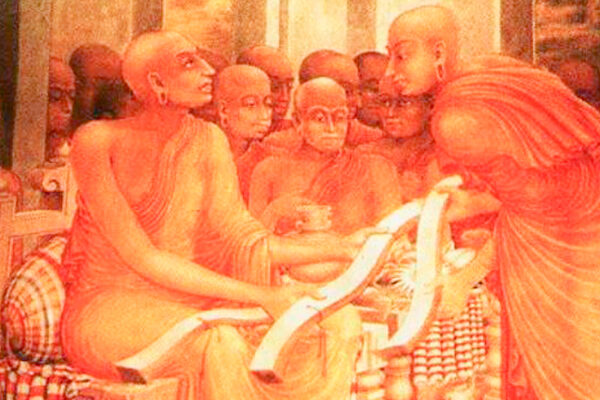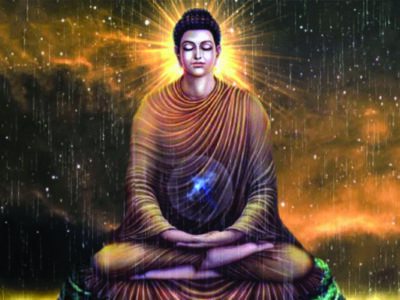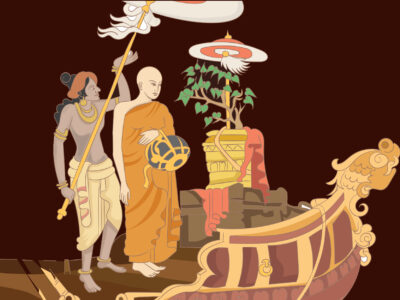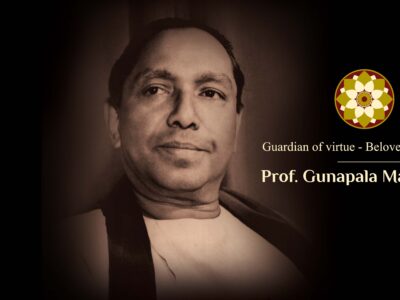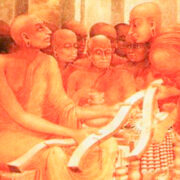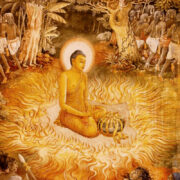By-Sir D. B. Jayathilaka
To a Buddhist the idea of a universal religion has in it nothing unfamiliar or strange. It is to him inherent in the very conception of the Buddha the all wise, all – compassionate Teacher. The Buddha appeared on this earth for the good of all, for the happiness of all, to bring to all the glad tidings of emancipation from evil and sorrow. His message is thus for the whole world. It is of course not likely that at any particular time all men will be professedly Buddhist. What is of real importance is that the truth for which the teachings of Buddhism stand, should more and more influence mankind, for in proportion as that influence grows, the true progress and happiness of the world will be most assuredly promoted. Happily the spirit of the Dharma is surely, if indeed slowly, permeating the thought of the world and penetrating into the hearts of en, and signs are not wanting which indicate that the coming Religion – by which I mean the expression of the highest spiritual ideals of the age – will to a very large extent bear the impress of the Dharma. It is only natural that this should be so, for when the Buddha Dharma is rightly understood, it will be found to embody those qualities which in the opinion of thoughtful men will characterize the Religion of the future. Let us consider one or two of these essential points. First of all is the feature of Universality, to which I have already adverted. I refer to it again here partly for the purpose of removing a very common error. The Buddha is the World-Teacher (Sattha Deva Manussanam) and his message is addressed to all mankind, irrespective of race, colour, caste or sex. This note of universality which characterizes Buddhism is no afterthought, no subsequent development in career, due to some accident of history. It was struck by the Master himself not at the close of his earthly life, but at the very beginning of his public ministry when he sent out his disciples with the injunction that they should wander over the world, out of compassion for mankind, for the good of the many, for the welfare of the many, and set forth the higher life in all its fullness and in all its purity. And the message thus proclaimed brings peace and happiness equally to all, to the poor and the lowly as well as to the high and the mighty to Bimbisara, the sovereign Lord of the Magadhas, and Sunita, the outcast scavenger, to the merchant prince Anatha Pindika and the beggar Indaka, to the Sakyan Queen – mother Prajapati and Capa, the hunter’s wife, to the wealthy and high-souled matron, Visakha, the courtesan Ambapali, and the sorrow – stricken Patacara to the Brahmnan sage Pokkarasati and the child Sopaka. Though the mission of Buddhism is thus all embracing, it is not infrequently described by Western writers as a rigid asceticism cult meant for recluses, who have withdrawn from the ordinary life of the world into the seclusion of the monastery or the forest. This is a serious misconception. Buddhism does indeed insist on the high value of renunciation, the giving up of what one holds dear and precious, for the sake of the Truth. “Every good deed has in it the element of renunciation” – says the Buddha. It is at the same time recognized that utter self-sacrifice even for the sake of the higher life is at any particular time possible only for the few, while the majority must follow a less difficult path and train themselves in the sphere of duties attached to household life. The due performance of these duties is extolled by the Buddha in no unmistakable terms. On one occasion, he was asked what is the highest blessing? He answered the question in several verses one of which translated runs:-
“To support father and mother,
To maintain wife and child,
To be engaged in blameless occupations
This is the highest blessing:”
(Mangala Sutta)
Surely this is not asceticism. In fact the Buddha Dharma condemns all ascetic practices which involve self-mortification as painful, ignoble, and unprofitable, just as it discourages and disapproves of all forms of self-indulgence. Buddhism teaches the middle Path (Majjhimapatipada) along with man may advance to perfection. It attaches little value to mere external practices and appearances. The transformation of the heart is the only important thing. “The eschewing of clothes, wearing of matted hair, smearing the body with dirt, fasting, sleeping on the ground, being unwashed and unclean – none of these practices purifies the man. But if a man, though he may wear fine clothes and costly jewels, yet keeps his mind serene, calm and controlled, and leads a chaste life, and refrains from hurting all beings, he is the holy person (Brahman), he is the true ascetic (Sramana) and he is the true disciple (Bhikkhu) – Dhammapada X, 13.14.
The coming religion, it has been well said, must appeal to reason, and stand the test of human experience. Buddhism completely fulfills the requirement. One of its most striking features is its rationality in first place there is no veil of mystery which envelopes either the person or the teachings of the Master. The Buddha never claimed to be a supernatural being, nor did he ever say that the truths he taught were discovered by him by means of supernatural intervention or agency. He was, to begin with, a man, the son of human parents. And his attainment to truth was gained not by the aid of any external power, but by the conquest of his passion in his own heart. The summit of perfection to which he attained by his own endeavours is within the reach of all of us, if we will only put forth the necessary effort.
In fact we are all potential Buddhas. A nobler teaching has never been given to the world. It adds enormously to the ordinary estimate of the potentially of man. It teaches us to recognize in the meanest and humblest of our fellow-beings the possibilities of all that which is great and good. It inspires us with courage and confidence, whenever the darkness of sorrow and trouble casts its thick gloom around us, whenever we feel discouraged by failures and seemingly insuperable difficulties, there rises before our mind’s eye the heroic figure of the Master who conquered by his own efforts and there rings in our ears the heartening message; “Let not your heart fail, for if you preserve you shall conquer, even as I have conquered.”
Again Buddhism offers no dogmas the belief in which is necessary for salvation. It is understanding, knowledge, wisdom that purifies not mere faith. The seat of authority is Reason which must prescribe for each one of us the rule of life. On one occasion some people came to the Buddha with a difficulty. Different teachers, they said, came to them at different times and each of them praised their own teaching and condemned that of the others. What were they to do, which teaching they were to accept? Accept no teaching. Replied the Blessed one, because it is handed down in tradition, or because it is taught by such and such a teacher, or because it can be proved by mere subtleties of logic. But accept teaching and act up to it if in your reason you are convinced that it is conducive to moral welfare. There you see reason emancipated from the bonds of superstition and the fetters of external authority. Buddhism has ever been taught and propagated under this great charter of mental liberty. Is it then a matter for wonder if it has been always filled with the loftiest spirit of tolerance, and if the blot of persecution and was of religion has never stained the pages of its long history? Wherever Buddhism gained a foothold, it gave free scope to all intellectual activities. It encouraged learning, for it taught salvation by enlightenment and held all advancement of knowledge to be a means to that end. India reached the zenith of her glory during the Buddhist period. In Ceylon the mighty achievements of our ancestor in various fields of activity were all associated with Buddhism. In Japan, it has been the kind foster mother of art and science. Further, so far as the teachings of the Buddha are concerned, there never was and there never can be a conflict between science and religion, and the reason for this is not far to seek. The Buddha Dhamma contains no speculations as to the origin of things and first causes, which form the most important battle ground in the warfare between science and religion. In fact Buddhism condemns all such vague speculations as utterly unprofitable. Upon the sure foundation of principles derived from the facts of life it builds a system of practical ethics a method of self-culture, which has for its end the emancipation of man from all evil and all suffering. The training is threefold, and it is summed up for us in the famous utterance of the Master which contains the essence of all his teachings. It is this:-
To abstain from all evil,
To fulfill all good,
To purify the heart
This is the teaching of the Buddha
That is very simple teaching. For one thing it involves no dogmas, no rite and ceremonies, which in the history of religions have been so fruitful a cause of dissension among men. Still if you examine that little verse more closely, you will find that it contains a profound and comprehensive teaching. It touches life at all points and covers the whole sphere of conduct and moral progress. Now what is evil, and what is good? From the Buddhist stand point everything is evil, sin, which harms others and hinders one’s own moral advancement, while on the other hand everything is good, which is helpful to others and promote one’s own spiritual progress. As the first requisite of the moral life, Buddhism demands the avoidance of evil. This may be regarded as a negative teaching of little value, but that is not so. Abstinence is of utmost importance in ethical training, for it involves self-restraint which forms the first rung in the ladder of progress. To be a decent member of society, a good citizen, one must undertake to abstain from certain things which are hurtful to the community. So if any one wishes to lead the good life, he must abstain from those acts the avoidance of which is essential alike to the welfare of the individual and the community. First of all he must refrain from (1) destroying life, (2) from taking by force or fraud that which does not belong to him (3) from all forms of unchastity, (4) from untruthfulness, (5) from the use of intoxicating drinks and drugs. Then he must not be engaged in any trade or occupation which may cause harm and suffering to others. He must not, for example, be engaged in the traffic of human beings, in the manufacture and sale of intoxicants, or in the manufacture and sale of weapons of destruction. While one abstains from evil, one must also try to do positive good which is helpful to others. “Be diligent in doing good” says the Buddha, “for the mind of him, who falters in good works, clings to that which is evil.” But the avoidance of evil and the doing of good even though important are not in themselves sufficient. There is yet one more thing to add. The mind is the spring of action, the fountain head of all our efforts. It is the attitude of the mind that constitutes the real value of an act. Buddhism therefore attaches the highest importance to the third part of its system of self-culture the purifying of the mind. The dust of passion – ill will, lust, ignorance, has settled on it, and it must be our endeavor to remove this dust and restore the mind to its pristine brightness, so that Truth in all its beauteous forms may mirror itself on its surface. How may this be done? By the diligent, deliberate, and persevering exercise of those qualities which are opposed to the evils that becloud the mind and prevent it from seeing things as they really are. Among these purifying tendencies, the first place is given to Love. “All the means that can be used as bases for doing right are not worth the sixteenth part of the emancipation of heart through Love. That takes all these up into itself outshining them in radiance and glory.” Love, universal love, is the remedy for all the ills that afflict mankind, but it is rightly and fully practiced only when we can say with the Master; “Our mind will not waver, nor evil speech will we utter, tender and compassionate will we abide, loving in heart, void of malice within. We will be never be suffering with the rays of our loving thoughts. And with that feeling as a basis we will ever be suffusing the whole world with thoughts of love, far reaching, grown great, beyond measure, void of anger or ill-will” (Majjhima 1, 129). That is the ideal that is the goal set before the disciples of the Buddha. In the presence of such love, all ill-will must disappear, all hatreds must cease, and all embracing good-will must ensue. Now he who practices this three-fold teaching has his feet well painted on the path – the Ariyan Path “which leads to peace, to insight, to the higher wisdom, to Nibbana.”
It may well be asked: why should men give up evil, do what is good, and purify the heart; in short what is the incentive to the leading of the higher life? The motive may be considered as two-fold, the desire for one’s own good, and the good of others. None of us are free from sorrow and suffering and we all realize how imperfect we are. We wish to be perfect. We also realize that there is suffering and happiness all around us and we wish at least in our unselfish moments to relieve that suffering and remove the causes of that unhappiness. These two desires supply an adequate motive for all right endeavours. They are not, as some may think, opposed to each other. They are in fact the two aspects of the same motive force. For your own good is involved in the good of all, and you can perfect yourself only to the extent you forget yourself in the service of others. So after all, it is the love of humanity – the enthusiasm for the welfare of your fellow beings that can drive man along the path of righteousness. That is the spirit of the Buddha Dharma; that I feel confident, will be the spirit of the World Religion of Tomorrow.
(Kind courtesy – The Buddhist)

